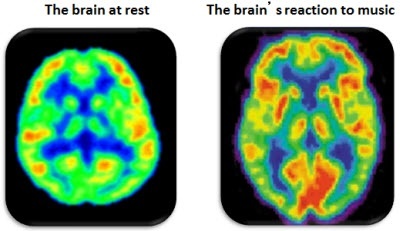Music is a universal language and many people use it everywhere. Music is not only applied to entertainment but, can also be used for storytelling, religious rituals, and therapy. It has great benefits but, the most interesting thing about music is its effects on the brain. It is the only activity that activates, stimulates and uses the entire brain.

According to Music training can change children’s brain structure and boost decision-making network, by USC communication specialist, Emily Gersema music can :
- Increases IQ
- Improves Spatial-Temporal Skills
- Increase Language Development
- Ignites Social and Moral Development
- Can Make You Happier and Brings Joy To Others (Gersema, 2017)
Scientists have used several techniques, including behavioral testing, structural and functional MRI scans, and EEG to track electrical activity in the brains.
The following clip shows John Iverson, a USCD neuroscientist who studies music. He emphasizes the SIMPHONY study, how children perceive rhythm and how musical rhythm can be used as medicine.
Does Music Change a Child’s Brain
From the information above, it is evident to conclude that musical shows or singing shows can be extremely beneficial to a child’s moral and social development. This programming can be motivating/ inspiring for children to get involved in the music scene, work on their vocals or learn an instrument. There is an enormous amount of programming for children that have a strong emphasis on music and catchy tunes like Victorious, The Fresh Beat Band, Glee, SchoolHouse Rock, Jacks Big Music Show and Yo Gabba Gabba!
In addition, there are also competitive shows that broadcast talents like Little Big Shots, American Idol, America’s Got Talent and The Rap Game which give children of all ages an opportunity to show their drive for stardom







